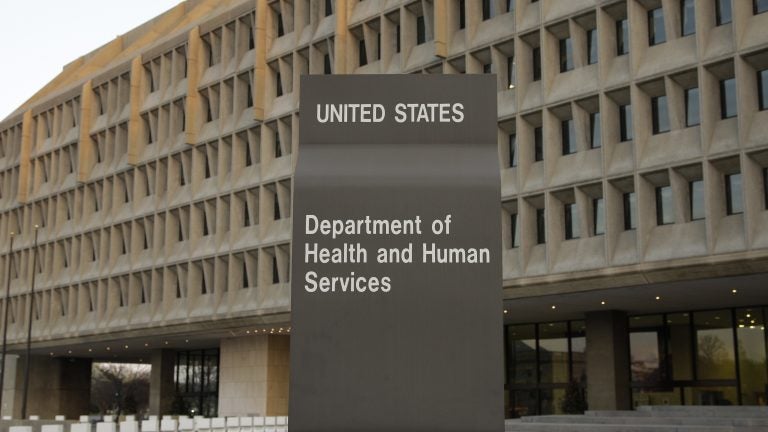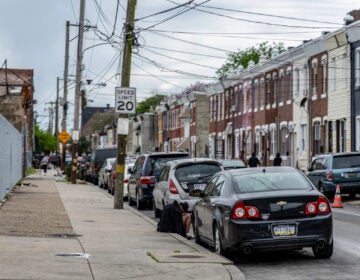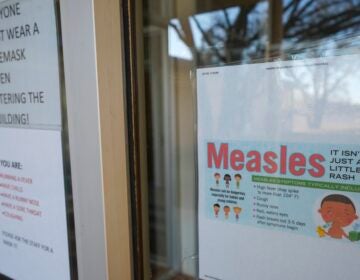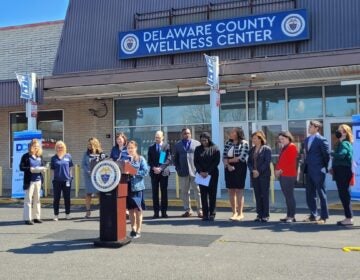Pennsylvania and New Jersey leaders warn that DOGE cuts to health agencies could limit care and services
Federal agencies notified state, city and local health departments last week of immediate cuts to U.S. Dept. of Health and Human Services grants.
Listen 1:19
The Department of Health and Human Services. (Alex Brandon/AP)
From Philly and the Pa. suburbs to South Jersey and Delaware, what would you like WHYY News to cover? Let us know!
Last week, the federal government sent notices to state, county and city health departments that millions of dollars in grant money supporting programs for sexual health services, mental health and addiction treatment were being cut, effective immediately.
The Department of Government Efficiency, or DOGE, is spearheading the funding cuts as part of President Donald Trump’s larger plan to reduce spending and shrink the footprint of the federal government.
The new funding changes, which affect grants awarded by the U.S. Department of Health and Human Services, have left several state and local health departments in New Jersey and Pennsylvania reassessing their options.
Other leaders and public health officials are warning that the cuts, some totaling as much as $350 million, will limit access to certain health care services and set back public health achievements.
“These irrational and inexplicable cuts have created an unfillable void in funding that will have disastrous ramifications for our most vulnerable neighbors,” New Jersey Gov. Phil Murphy said in a statement.
Pennsylvania
Federal grant funding on the chopping block includes at least $301 million to the Pennsylvania Department of Health, according to a database on DOGE’s website that lists grant cuts as federal savings.
Additional grant cuts specifically to the Pennsylvania Department of Drug and Alcohol Programs are listed in the database for at least $28 million or more.
These amounts have not been confirmed or verified by state officials and DOGE has reported incorrect data in the past.
HHS includes federal agencies like the Centers for Disease Control and Prevention and the Substance Abuse and Mental Health Services Administration.
In a statement, the Pennsylvania Department of Health said it is “currently reviewing the information received from the CDC and is assessing the potential impacts on programs and services for the people of Pennsylvania.”
Many county health departments get portions of the state’s federal grant money.
The cuts include money that Montgomery County has been using for services like counseling, drug addiction treatment and mental health services, said Neil Makhija, chair of the Montgomery County Board of Commissioners.
He said thousands of residents use these services each year, and grants from the Substance Abuse and Mental Health Services Administration have been paying for them. Another grant that has gone away is a $6 million grant to cover part of the cost of a new emergency behavioral health center, which was supposed to open at the end of the year.
However, Makhija said it’s not clear what will ultimately happen because these cuts will most likely be challenged in court.
“One day we think a source of funding is completely gone, the next day, either through litigation or through backtracking of the administration, the funding remains,” he said. “There’s generally a state of chaos.”
He added that if the cuts go through, the county may have to pay for these services another way, or reduce them.
Republican U.S. Rep. Brian Fitzpatrick, who represents Montgomery and Bucks counties, did not respond to a request for comment, and neither did a spokesperson for HHS.
At the Delaware County Health Department, officials said the eliminated federal funding includes the Epidemiology and Laboratory Capacity grant, which supported ongoing COVID-19 testing resources, administrative utilities and epidemiological staff.
The county’s allocation of the grant money was $2.6 million over the next two years and covered seven staff members, a spokesperson said in a statement.
“This funding was anticipated to expire in the next two years, and DCHD has been working on plans to transition funding support accordingly,” the department said. “At this time, we are waiting for guidance from the Pennsylvania Department of Health regarding next steps.”
In Philadelphia, federal cuts to the city’s Department of Public Health include at least $6.9 million from one grant and another $33.5 million from another, according to the DOGE database.
“We are closely monitoring changes to federal funding streams that may impact City services, and are aware of the CDC’s announcement. We are exploring all options for recourse,” a spokesperson said in a statement.
New Jersey
Federal grant cuts include a total of $350 million originally allocated to the New Jersey Department of Health and the New Jersey Department of Human Services, state officials said.
Gov. Murphy said the cuts affect the state’s ability to contain and monitor infectious diseases like measles or tuberculosis, as well as bird flu.
“These cuts will force our state to take contact tracers out of the field and vastly limit the ability of local health departments to follow up on reported cases,” Murphy said in a statement.
The governor added that the cuts “will make it harder for parents to find vaccinations for their children, for providers to get lab results back in time to prevent the spread of severe illness, and for Federally Qualified Health Centers to deliver care.”
The loss of funding will also impact programs and services that provide treatment for mental health and substance use disorder, according to state officials.
“We will do everything we can to restore this funding — including taking legal action — so we can keep the people of New Jersey safe and healthy,” Murphy said.
Delaware
The DOGE database includes cuts to multiple Delaware Department of Health and Social Services grants, totalling more than $3 million.
“We are closely monitoring the sudden clawbacks of federal grant funds enacted this week to assess the full impact of what could result in significant changes to essential services that protect the public health for all Delawareans,” a spokesperson said in a statement.

Show your support for local public media
WHYY is your source for fact-based, in-depth journalism and information. As a nonprofit organization, we rely on financial support from readers like you. Please give today.









